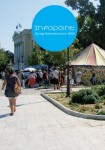In October 2009, the Initial Reception Centre in Pagani on the island of Lesvos was officially closed, after a wave of revolts of the detained migrants and a worldwide scandalisation of the conditions inside the jail. Despite announcements of the government to build a new detention centre in Lesvos, Pagani is still the only detention infrastructure on the island. The former goods warehouse is used for the interim detention of newly arrived refugees and migrants. Unlike before, when hundreds of migrants where kept for months in closed cells, fewer people stay there for some days only until they are transferred to the reception centre on the closely located island Chios. However, since the closure of Pagani it has become clear that the old system of detention under horrible conditions cannot be continued and will be replaced by a more human rights compatible system of detention in line with the existing models in the European detention landscape.
Indicative of this change in policy, which also stems from the change of the Greek government in October 2009, is the statement of the then newly instated Deputy Citizens’ Protection Minister Spyros Vougias during his visit of Pagani in October 2009, shortly before the actual closing of the detention centre by his ministery. He promised “to upgrade infrastructure and curb bureaucracy so that the migrants are detained for shorter periods of time and with more dignity”.




